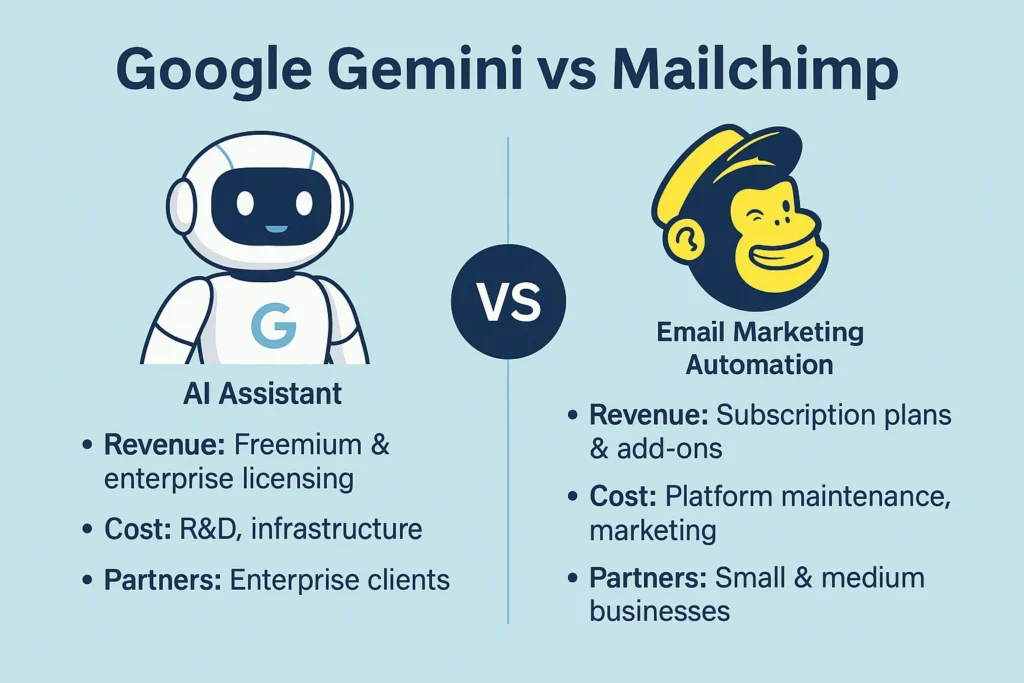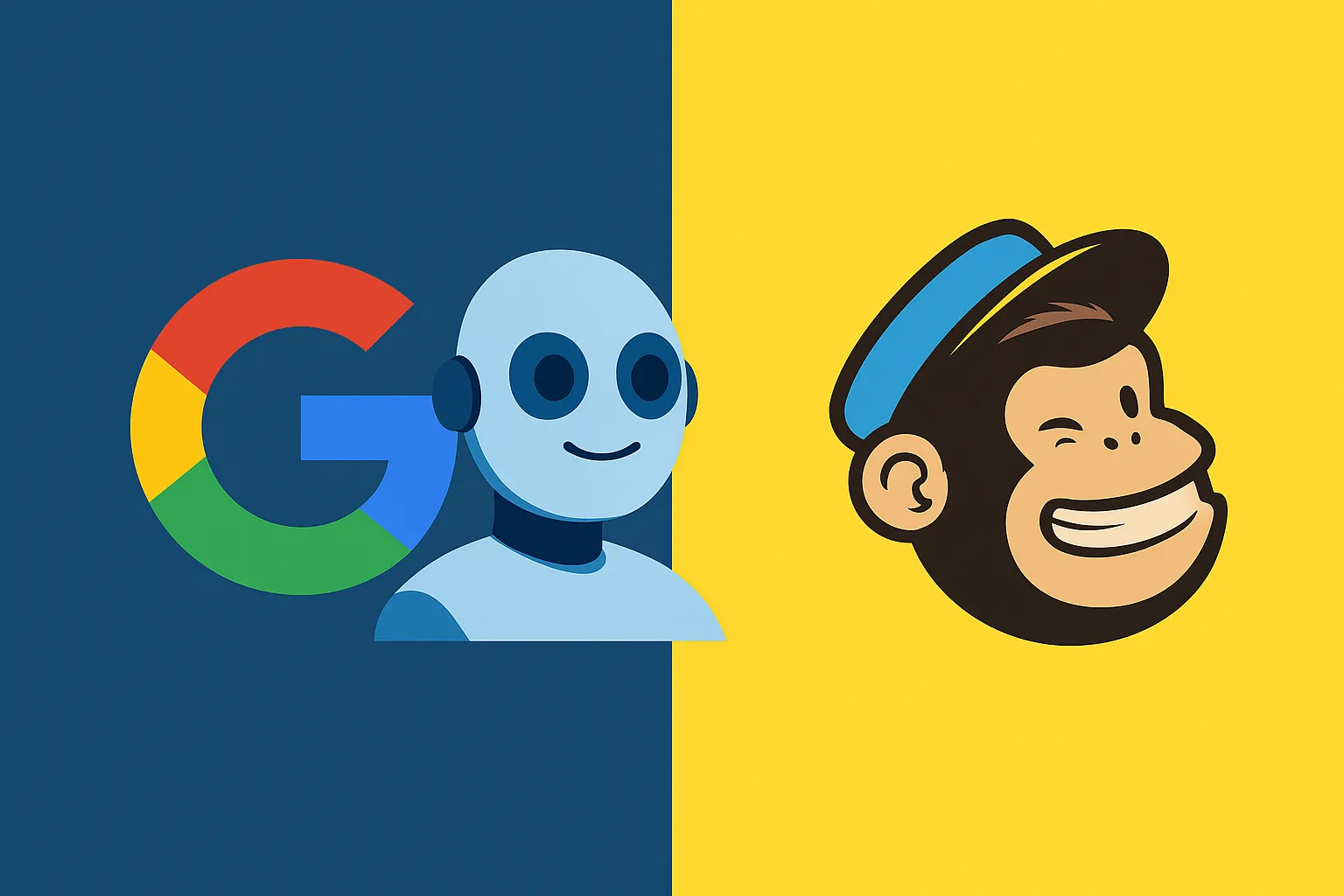In 2025, AI-driven productivity tools and digital marketing platforms are undergoing rapid convergence. Startups and entrepreneurs are now evaluating whether to invest in an AI-first assistant like Google Gemini or build a more structured email marketing automation platform like Mailchimp.
The stakes are high — both in terms of market share and monetization potential. With Google Gemini transforming into a multimodal AI marketing co-pilot and Mailchimp deepening its CRM capabilities under the Intuit umbrella, this comparison is more relevant than ever.
If you’re a startup founder, SaaS builder, or digital product strategist, understanding the business model dynamics of these platforms is essential before choosing which path to clone, adapt, or integrate into your own offering.
In this blog, we’ll explore each platform’s purpose, their business models (including revenue, cost structure, growth engine, and partnerships), and provide a data-backed comparison with recommendations for 2025.

What is Google Gemini?
Google Gemini is Google’s flagship AI assistant and productivity tool, built on its advanced large language models (LLMs). It replaces Google Bard and is now deeply integrated into:
- Google Workspace (Gmail, Docs, Sheets)
- Google Ads
- Android & Chrome OS
- Cloud APIs for developers
Google Gemini serves as a conversational interface for generating content, summarizing data, writing code, building marketing campaigns, and automating business processes. By 2025, it’s positioned as an AI marketing assistant, rivaling tools like ChatGPT, Jasper, and even legacy marketing automation software.
What is Mailchimp?
Mailchimp is a marketing automation and email campaign platform launched in 2001 and acquired by Intuit in 2021. Initially focused on small business email campaigns, it now offers:
- Customer journey automation
- Audience segmentation & targeting
- Pre-built templates for email, ads, and landing pages
- CRM features (tagging, behavioral targeting, A/B testing)
- Social posting and ads integration
Despite AI upgrades in recent years, Mailchimp still centers around email as the core channel, making it a specialized tool with a long-standing brand presence.
Business Model of Google Gemini
Revenue Streams
- Freemium AI Access (limited usage via Gemini Basic)
- Gemini Advanced Subscription (monthly, tied to Google One)
- Gemini for Workspace & Enterprise (AI assistants in Gmail, Docs, Ads)
- Gemini API via Vertex AI (pay-as-you-go developer access)
- Indirect Ads Revenue Boost (via campaign insights, content generation)
Cost Structure
- High infrastructure costs (TPUs, model training, data centers)
- Ongoing AI R&D and model refinement
- Regulatory compliance (GDPR, AI transparency, data privacy)
- Customer support and enterprise integration
Key Partners
- Google Workspace – direct integration
- Google Ads – native marketing enhancement
- Cloud Providers – TPU/ML infrastructure
- Developer Communities – integrations with Firebase, AppSheet
Growth Engine
- Deep platform integration (Chrome, Android, Gmail)
- Viral adoption via free access
- Cross-promotion in Google ecosystem (YouTube, Ads, Search)
- Enterprise bundling with Workspace and Cloud offerings
Learn More: Business Model of Google Gemini – How Google Monetizes AI
Business Model of Mailchimp
Revenue Streams
- Subscription Plans (Free, Essentials, Standard, Premium)
- Audience-based Pricing (cost increases with contact list size)
- Pay-As-You-Go Email Credits
- Transactional Emails via Mandrill
- Value-adds: Landing page builder, SMS, social media posting
- Intuit Ecosystem Upsells: Cross-promotion with QuickBooks, Credit Karma
Cost Structure
- Hosting, spam-filtering, and deliverability tech
- Template design and automation infrastructure
- Customer support and training tools
- Email analytics and compliance costs
Key Partners
- E-commerce: Shopify, WooCommerce, BigCommerce
- CRM: Salesforce, Zoho, HubSpot
- Social Media: Facebook, Instagram
- Payment & Invoicing: Integrated with Intuit suite
Growth Engine
- Long-standing brand equity
- Affiliate and referral marketing
- Freemium entry point for small businesses
- Simple, scalable upgrade paths based on audience size
Learn More: Mailchimp Features That Help Your Business Grow
Comparison Table: Google Gemini vs Mailchimp
| Feature | Google Gemini | Mailchimp |
|---|---|---|
| Type | AI Assistant & Content Generator | Email Marketing & Automation Platform |
| Core Focus | Productivity + AI Campaign Assistance | Email Campaigns + CRM |
| Revenue Model | Freemium + SaaS + API Billing | Subscription + Pay-as-you-go + CRM Upsells |
| AI Capabilities | Advanced (LLM-powered) | Basic (copywriting assistant) |
| Integration | Deep (Gmail, Docs, Ads, Android) | Broad (Shopify, CRM, social platforms) |
| Target Audience | Creators, SMBs, Enterprises, Developers | SMBs, E-commerce, Marketers |
| Business Model Flexibility | High (modular, API-driven) | Medium (package-based tiers) |
| Customization | High (via APIs, prompts, context) | Medium (via templates, user journeys) |
| Data Ownership & Control | Google-owned, less transparent | User-driven lists and segmentation |
Pros & Cons of Google Gemini Business Model
Pros
- Scalable across use cases: writing, coding, marketing
- Massive Google ecosystem integration
- Freemium model accelerates adoption
- Ideal for AI-first apps and automation startups
Cons
- Heavy dependence on cloud infrastructure
- Privacy and data usage concerns
- Harder to monetize without deep AI product understanding
Pros & Cons of Mailchimp Business Model
Pros
- Proven email marketing monetization
- Easy to onboard small businesses
- Predictable revenue from subscriptions
- Rich partner ecosystem (ecom, social, CRM)
Cons
- Less future-proof without strong AI tools
- Saturated market with limited innovation
- Depends heavily on email as a single channel
Market Data: Growth, Revenue, Funding
| Metric | Google Gemini | Mailchimp |
|---|---|---|
| 2024 Revenue Estimate | $1B+ (part of Google Cloud & Ads units) | ~$1B (under Intuit) |
| User Base | 300M+ (Workspace, Gemini users globally) | 15M+ Users, 800K+ paid customers |
| Funding | Alphabet-funded (internal R&D) | Acquired by Intuit for $12B (2021) |
| YoY Growth (2024–2025) | ~35% (AI-driven adoption) | ~8–10% (stable marketing SaaS growth) |
| Profitability | Not directly reported, likely break-even | Profitable under Intuit |
Which Model is Better for Startups in 2025?
Both models offer unique advantages, but startup alignment depends on your product vision:
- If you’re building an AI-first assistant, automation tool, or developer-focused SaaS, Google Gemini’s model offers unmatched versatility.
- If your goal is to serve SMBs and e-commerce clients with predictable marketing tools, Mailchimp’s mature SaaS structure makes scaling easier.
Choose Google Gemini-style if…
You are building:
- AI-powered content tools
- Developer platforms or productivity assistants
- Conversational UI or GPT-style tools
- Workflow automation SaaS with intelligent suggestions
Launch your Google Gemini Clone App with Miracuves
Choose Mailchimp-style if…
You are building:
- Email and marketing automation platforms
- CRM-integrated SaaS for SMBs
- Niche tools for real estate, coaches, or consultants
- Platforms requiring predictable subscription revenue
Launch your Mailchimp Clone App with Miracuves
Conclusion
In the battle of AI-powered assistants vs email automation veterans, both Google Gemini and Mailchimp offer valid business model frameworks — depending on your audience and ambition.
- Gemini’s flexibility and cutting-edge AI make it ideal for forward-thinking, tech-heavy startups.
- Mailchimp’s reliability and email-focused monetization make it ideal for niche SaaS and marketing solutions.
At Miracuves, we help visionary founders build AI tools, marketing platforms, and scalable SaaS products inspired by world-class business models like Gemini and Mailchimp. Whether you need a clone, a custom build, or product strategy — we’re your launch partner.
FAQs
1. What is the Google Gemini business model?
Gemini follows a freemium + subscription + API model, generating revenue via Google One, Workspace, and Vertex AI APIs.
2. How does Mailchimp make money?
Mailchimp earns through tiered subscriptions, pay-as-you-go email credits, and upsells via its integrations and CRM tools.
3. Which is better for startups — Google Gemini or Mailchimp?
For AI-focused startups, Gemini wins. For niche marketing SaaS or email platforms, Mailchimp offers better structure.
4. Can I build an app like Google Gemini?
Yes, Miracuves offers custom AI assistant development and Google Gemini-style clone apps tailored to your specific use case — all starting at just $3299.
5. Is Mailchimp still relevant in 2025?
Absolutely — especially for SMBs and marketers who prefer predictable email automation over AI experimentation.








